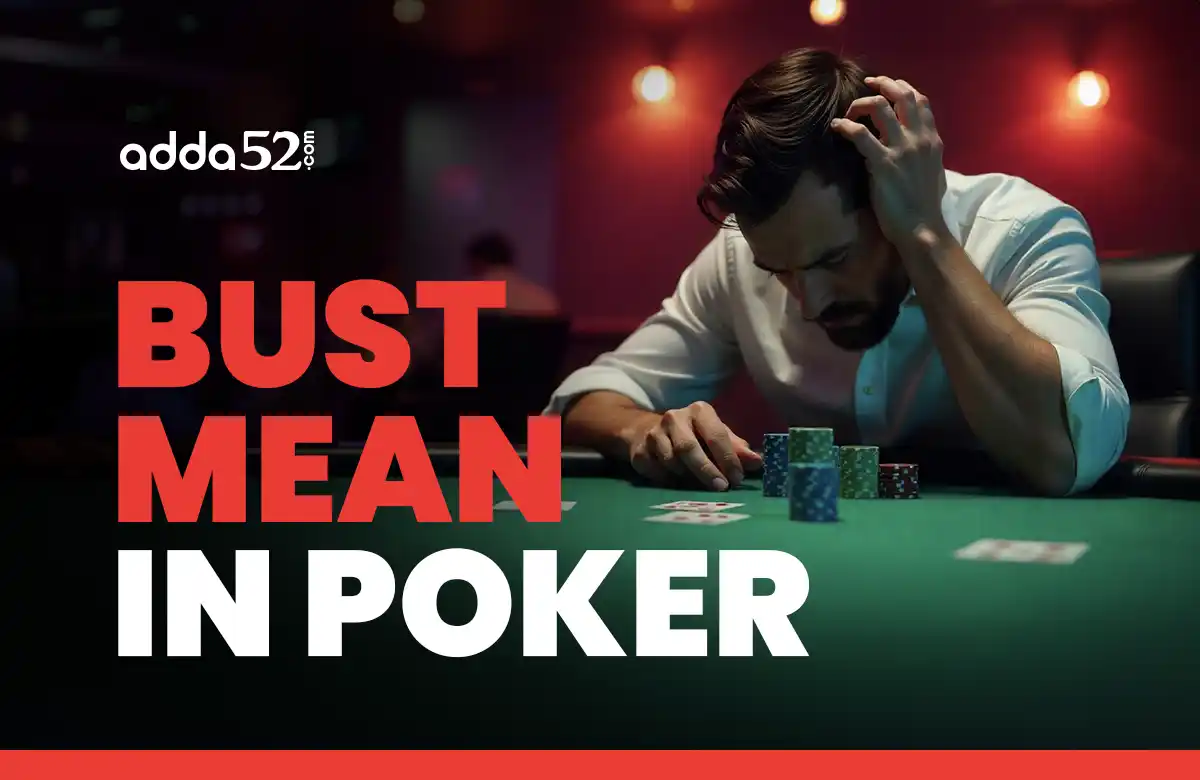
Introduction
While many players dream of making it big at the Poker table, the reality is that going bust is a common experience, even for seasoned players. Losing your bankroll can be emotionally and financially draining, but it’s not the end of your Poker journey.
This blog will explore the definition of bust poker and strategies to prevent it.
What is ‘Going Bust’ in Poker?
In cash games, going bust means losing all your chips and needing to rebuy or leave the table. In tournaments, going bust means being eliminated when you lose your last chips unless it's a rebuy event.
Different Ways Players Go Bust in Poker
There are several ways a player can go bust:
-
Losing an All-in Battle
Going all-in is a high-risk, high-reward move that can double your stack or send you to the rail. Players who shove all their chips into the pot commit everything to a single hand. Some players go all-in with a premium hand, only to get called by a slightly weaker hand that outdraws them. Others take unnecessary risks by shoving with marginal hands or overplaying their hand strength, leading to a bust-out.
Example: You are playing in a ₹5,000 buy-in tournament and pick up A♠ K♠ on the button. You raise, and a player in the small blind re-raises all-in for 40 big blinds. You call and see that your opponent has Q♥ Q♦.
The board runs out J♠ 7♦ 5♥ 9♣ Q♣, giving your opponent a set of queens. Despite having a strong starting hand, you lose the all-in
-
Bad Bankroll Management
Bankroll management is one of the most critical aspects of long-term Poker success. Many players go bust because they play at too high stakes relative to their bankroll. Proper bankroll management requires maintaining a sufficient number of buy-ins to withstand downswings.
Example: You have a bankroll of ₹10,000 but decide to sit in a ₹1,000/₹2,000 cash game with ₹10,000 as your only buy-in. After a few hands, you get dealt J♦ J♣ and face an aggressive opponent who shoves all-in preflop. You call, and your opponent shows A♠ K♦.
The board comes A♥ 9♠ 5♣ 3♠ 7♦, and you lose your entire bankroll in one hand.
-
Overplaying a Weak Hand
A key skill in Poker is knowing the relative strength of your hand. Many players fall into the trap of overvaluing hands that are not as strong as they seem. This often happens when a player hits the top pair with a weak kicker, an overpair in a tough spot, or a middle-strength hand that cannot withstand aggression.
Example: You are playing a ₹25/₹50 cash game and hold A♠ 9♣ on a board of A♦ J♠ 7♥ 4♣ 2♠. You bet big on the river, thinking your top pair is good, but your opponent raises all in.
Despite sensing trouble, you convince yourself that the opponent is bluffing and call.
Your opponent turns over A♥ K♥, and you lose your entire stack.
-
Chasing Draws Recklessly
While drawing hands such as flush draws, straight draws, or even gutshot straight draws can be profitable when played correctly, they can also be a major source of losses when played recklessly.
Example: You are in a ₹50/₹100 cash game with 9♥ 8♥ and the flop comes J♥ 7♠ 2♠, giving you an open-ended straight draw. Your opponent bets the pot (₹5,000), and you call, hoping to hit your straight.
The turn is K♦, and your opponent bets another ₹10,000. You call again despite not having the right odds.
The river is 4♠, and you miss your draw. Your opponent shows A♠ A♦, and you lose a massive amount chasing a draw you shouldn’t have.
-
Tilt & Emotional Decisions
Tilt is one of the biggest bankroll killers in Poker. It occurs when a player loses emotional control after experiencing a bad beat, a cooler, or a series of unfortunate hands. This emotional state clouds judgment and leads to irrational play.
Example: You are playing a ₹10,000 buy-in tournament and lose a massive pot when your full house gets cracked by quads. Frustrated, you shove all-in on the next hand with J♣ 6♦, trying to win back your chips quickly.
Your opponent calls with A♥ Q♦, and the board runs out A♠ K♠ 8♣ 4♦ 2♥. You bust out, not because of bad luck but because of an emotional decision.
Busting in Cash Games vs. Tournaments
|
Game Type |
Going Bust Consequences |
|---|---|
|
Cash Games |
Players can rebuy anytime if they have money. Some poker rooms have a minimum buy-in requirement. |
|
Tournaments |
Players are eliminated if they bust unless it is a rebuy event. Prize money is awarded based on finishing positions. |
Example of Going Bust in a Cash Game
You have ₹10,000 in chips at a ₹50/₹100 No-Limit Hold’em cash game.
You have J♦ J♠ in the big blind.
The button raises to ₹300, and you 3-bet to ₹1,200. He 4-bets all-in for ₹10,000.
You call, and he shows A♠ K♠. The board runs Q♠ 10♠ 6♣ 7♣ 3♦.
He wins with Ace-high, and you lose your stack, forcing you to rebuy or leave.
Example of Going Bust in a Tournament
You are playing a ₹5,000 buy-in Poker tournament and have 20,000 chips.
You hold A♠ K♠, and an opponent shoves 15,000 chips all-in.
You call, and they reveal 10♣ 10♦.
The board runs 8♠ 5♦ 3♥ 10♠ 2♣ – your opponent hits trip tens, and you are left with only 5,000 chips.
You shove all in the next hand and lose, busting out of the tournament.
How to Avoid Going Bust at the Table
-
Follow Proper Bankroll Management
Proper bankroll strategy is crucial to surviving the inevitable swings in Poker. To withstand variance, a general rule is to have at least 20-50 buy-ins for cash games and 100 buy-ins for tournaments. Without adequate bankroll management, even skilled players can go broke due to short-term bad luck.
-
Manage Your Tilt
Tilt—emotional frustration caused by bad beats or losses—leads to reckless decisions and unnecessary aggression. Recognize when emotions affect your gameplay to prevent tilt and take a break if needed. Many professional players set stop-loss limits to avoid playing when they no longer think rationally.
-
Play Position Wisely
The position is one of the most critical aspects of Poker strategy, as acting last gives you more information before making decisions. Playing more hands in late position allows you to control the pot size and make more profitable plays. Conversely, playing too many hands from an early position can lead to trouble, as opponents will have the advantage of acting after you.
-
Be Selective with Hands
Not all hands are worth playing; being too loose with your starting hand selection can lead to losses. Stick to a solid preflop strategy by playing premium and speculative hands in the right situations. Learning when to fold weak hands will help conserve your bankroll and prevent unnecessary risks.
-
Use Stop-Loss and Win-Limit Strategies
Setting a stop-loss limit—such as quitting after losing three buy-ins—prevents you from spiralling into bigger losses due to emotional play. Similarly, having a win limit, such as leaving when you double your buy-in, helps you lock in profits and avoid unnecessary risks. These strategies ensure you maintain long-term profitability and avoid reckless decisions.
-
Avoid Playing Under Bad Conditions
Never play Poker when tired, distracted, or emotionally unstable. This can lead to poor decision-making. A clear mind helps you focus on strategy and make optimal plays rather than acting on impulse. Always ensure you are in a good mental state before sitting at the table to maximize your chances of success.
Frequently Asked Questions
What should you do immediately after going bust in poker?
First, step back and avoid making impulsive financial decisions to chase losses. Take a short break from the game to regain composure. When you return, start at lower stakes and ensure you have a proper bankroll before playing again.
How to prevent going bust in Poker?
Never risk more than a small percentage of your bankroll in a single game. Cash game players should have at least 20-30 buy-ins, while tournament players need 100+ buy-ins. Avoid tilt, as emotional decisions can lead to reckless plays. Also, choose games with weaker opponents, practice disciplined play, and continuously improve your Poker skills through study and experience.
Can professional Poker players go bust?
Yes, even professional players have gone bust at some point in their careers. However, professionals often have backup funds, multiple income streams, and proper risk management to prevent financial ruin.
Conclusion
Going bust is a harsh reality in Poker, but understanding why it happens and how to avoid it will make you a stronger, more profitable player. At the same time, knowing how to exploit opponents close to busting will give you an edge in cash games and tournaments.
